Myanmar coup: The young rebels risking their lives for the future
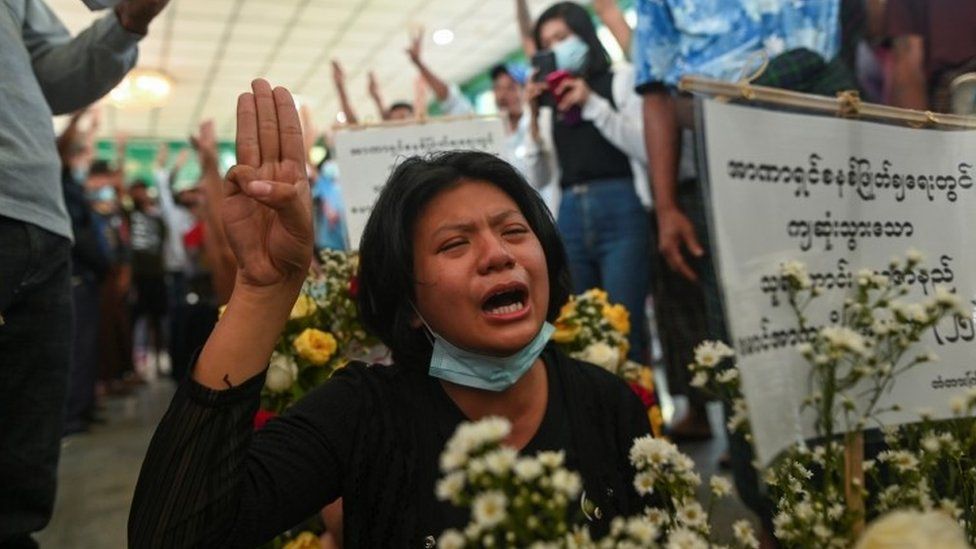 image copyrightReuters
image copyrightReutersMyanmar has been gripped by mass protests demanding an end to military rule, and at least 55 protesters - many of them young activists - have been killed. BBC Burmese's Nyein Chan Aye has been reporting from the frontlines in Yangon - and this is what he saw.
It's been more than a month since the military coup in Myanmar. People have endured internet blackouts, night-time raids, unlawful arrests, being chased down or beaten up in the streets, being shot at point-blank range, or being targeted by head or chest shots from long range.
Several dozen protesters have been killed in less than a week. A teenage girl, wearing a shirt that read "Everything will be OK", died after being shot in the head.
If you happen to be in a neighbourhood in Yangon in broad daylight these days, the smell of smoke is likely to hit you first more than anything. Small children taste tear gas or smoke bombs in their own homes. And there is not much else mothers can do but curse.
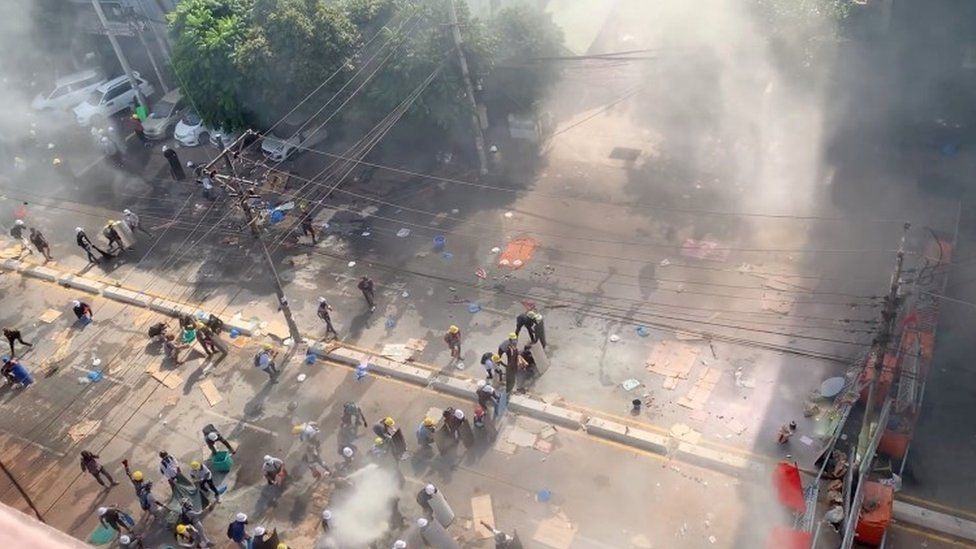 image copyrightReuters
image copyrightReutersLive rounds, rubber bullets, stun grenades, tear gas, water cannon, smoke bombs. You name it. Myanmar has seen all these already in less than a month.
And yet new waves of protests take place every day.
People have been boiling with rage over the junta's atrocities - but still the protesters are largely peaceful.
Creative forms of defiance - including sarongs
Students, monks, women, civil servants and even some police officers are joining in the movement against the regime. Some police taking part in the civil disobedience movement have been openly speaking out, saying they will no longer serve the military rulers and would rather serve the people.
So far the opposition is organised and determined. You see different kinds of defiance from dawn to dusk.
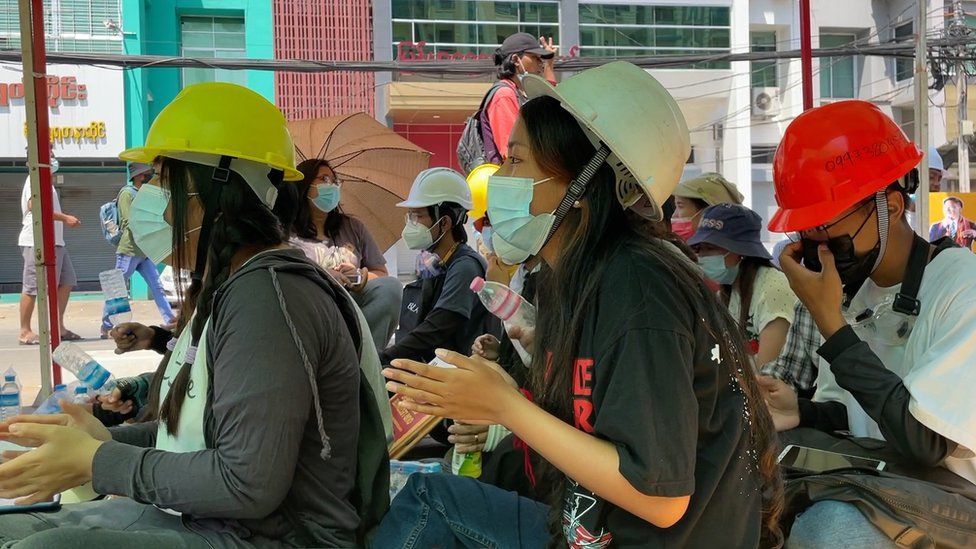
Simply clapping or singing a song - or even hanging out sarongs (called htamein in Burmese) in front of high-rise buildings - have become nothing short of opposition to military rule. Why sarongs? People believe that soldiers are superstitious and afraid of sarongs, which may weaken their strength and spiritual power.
As the demonstrations on the main roads were easily crushed by the security forces, protesters have started creating their own spaces in their neighbourhoods. Little fortresses made up of sand bags, rubbish bins filled with water or makeshift barricades can be seen almost everywhere in the city.
People in the neighbourhoods are also extremely supportive of each other. Many can be seen distributing food or protective gear for free. A common wish has been to uproot the military dictatorship for the sake of future generations. At the same time, people are reminding each other to stay alive and well, and to continue the fight against the regime.
Night-time banging of pots and pans, which people traditionally believe can drive evil out, has now been supplemented by home protests. People chant pro-democracy slogans at night from their balconies or sitting rooms to keep the fighting spirit alive amid all the deadly crackdowns.
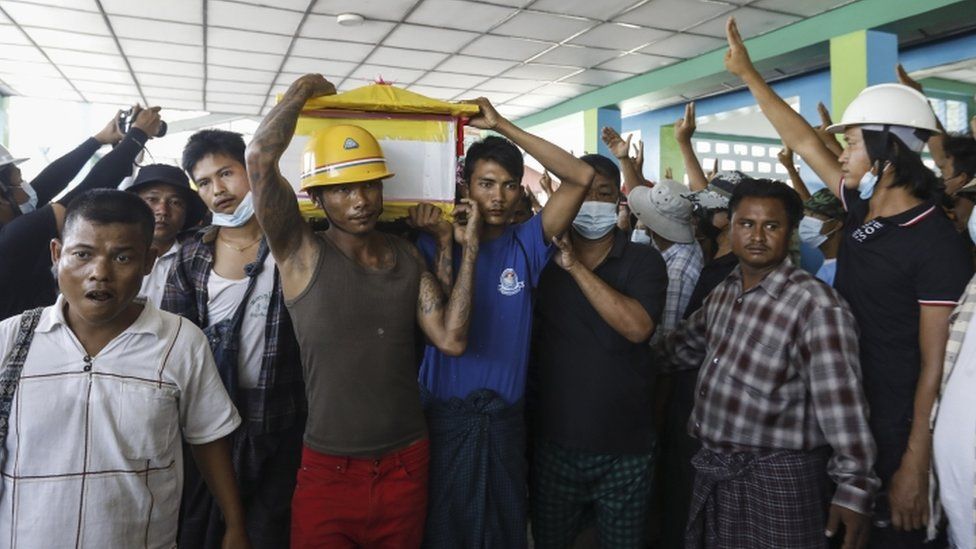 image copyrightEPA
image copyrightEPAIn many places the air resonates with the sounds of protest songs from previous uprisings against the military dictatorship, like "We won't forget until the end of the world" (Kabar Ma Kyay Bu in Burmese) or "Blood Oath" (Thway Thitsar). Or newly created songs by the younger generation like "Reject (the coup)" (Ah Lo Ma Shi) which vows: "We will fight to the end."
Being out on the streets has become dangerous, so home is the only place for some people to vent their spleens. Some light candles and pray for those who died during demonstrations, affectionately called "Fallen Heroes".
'Dictatorship must end'
In the late evening, you may also see groups of young people run through the streets making the revolutionary three-fingered salute - a symbol of the rebellion against the military takeover.
Street murals, cleverly created by young people, are also inevitable these days not just in Yangon but also in major cities across the country. Police loyal to the regime are kept busy late into the night trying to remove painted texts like "Reject the Military Coup" or "We Want Democracy".
The next day, young people are sure to go somewhere else and paint on the streets again.
At the same time, people are outraged at the brutality from the military and are calling for a stronger international response.
They are now becoming more frustrated than ever because the UN or South-East Asian regional body Asean cannot prevent the regime's barbaric acts. Bold declarations or statements, or even targeted sanctions by Western countries, do not seem to be enough for the people. Nor for the generals, who behave with arrogance towards the international community.
In recent demonstrations, many placards I have seen read: "How many dead bodies are needed for the UN to take action?"
But many people believe the best chance for the country's future may depend on young people and the momentum of the two wings of the ongoing anti-coup movements - street protest, and the civil disobedience campaign.
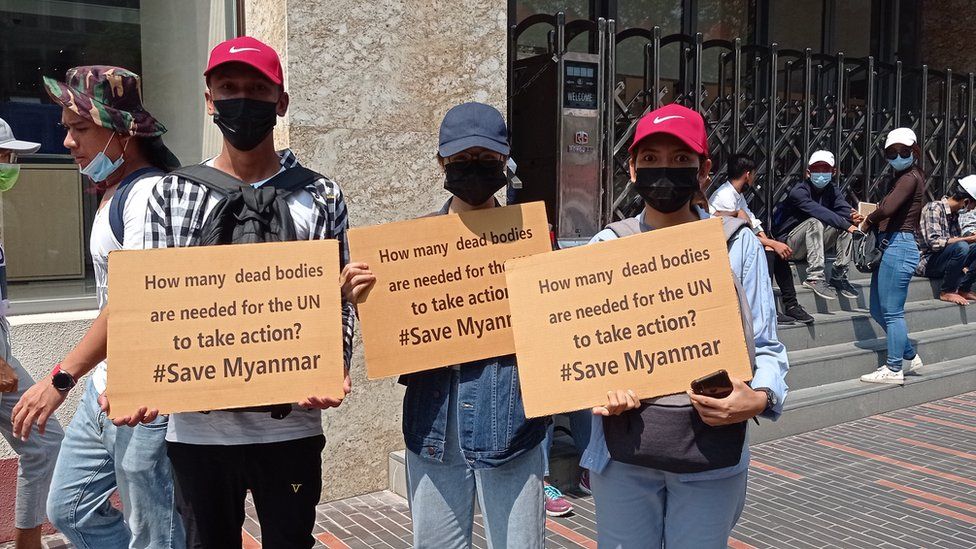
On one occasion, a protester with a youthful face with deep marks caused by regular use of gas masks during demonstrations removed his goggles and told me: "The military dictatorship must end in our era." He had written his blood type and a contact number for his next of kin on his helmet.
Generation Z, who are playing a leading role in this movement, know that blood is a heavy price to pay, even though their generation has only just come up against this bitter experience of military rule.
The nightmare of violence and terror may not go away easily, as Myanmar never completely got rid of its military junta legacy.
However, the younger generation has shown its sheer grit and determination to take down the regime.
Another young protester simply repeated the words: "The military dictatorship must end in our era."
Related Topics



No comments